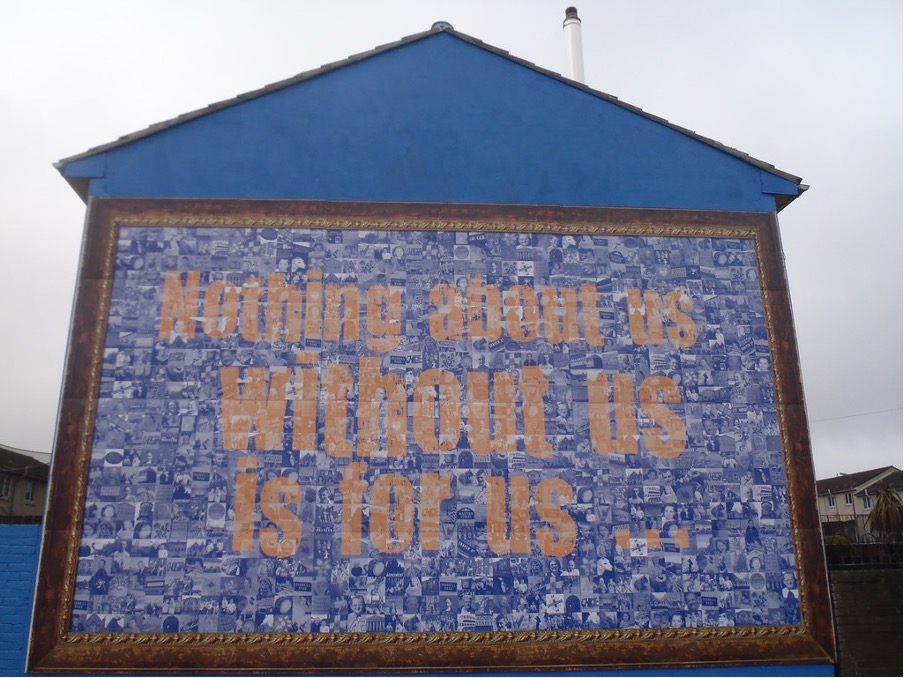This Disability History Month, writes Dr. Andy Flack,we would do well to remember that the past is not always a foreign country.
Injustice, exploitation, and pain are happening today, and they can be stopped. Indeed, Disability History Month (November-December), like the International Day of People with Disabilities (3 December) is a present danger to people living with disabilities.
Perhaps let me qualify that: I’m an historian, and I love history for its own sake. This gives me a particular perspective on the present. Both events tend to fetishize the celebration of ‘super-human’ feats of resilience, of overcoming, on the one hand, while heavily implying that the material marginalisation and suffering of people with disabilities is a thing of the past on the other. Tokenistic, and not infrequently designed and delivered by ‘Normals’ (and often ignoring the desire of people with disabilities to be at the heart of conceptualising and delivering such events), these events risk doing more to silence than to empower.
Whatever happened to ‘Nothing about us without us’…?

“‘Nothing about us without us is for us…'” by Elizabeth Thomsen https://www.flickr.com/photos/92987904@N00
People tend to avert their gaze from the ‘problem’ of disability.
The fact that COVID deaths have been sickeningly high among people with a range of physical and learning needs creeps into the news cycle, but soon enough will be conveniently forgotten. It’s eugenics in action, see, nature red in tooth and claw. The same is true of higher education institutions.
I’ll quote Lennard J. Davis at length: ‘…so much of left criticism has devoted itself to the issue of the body, of the social construction of sexuality and gender. Alternative bodies people this discourse … But lurking behind these images of transgression and deviance is a much more transgressive and deviant figure: the disabled body.’ Davis does not here articulate the assumption that such criticism assumes a norm of physical (and mental and psychological) ‘able-bodied, heteronormative, white, normalcy, nor does he directly address race here, but racialized bodies are a critical part of the diversity agenda.
Since disabled people are culturally constructed as the ‘ultimate deviants’, it is not surprising that higher education institutions choose to ignore (or pay tokenistic attention to) the challenge disability presents to a culture that is built on ablism at its extreme. Everyone in the academy is part of the hegemony of ablism – of ‘merit’, ‘high achievement’, ‘ultra-efficiency’, of one-size-fits-all.
What are universities doing to mark Disability History Month?
Is it being deployed as a means of purple-washing away questionable practices? And what about the International Day of People with Disabilities? We need to ask whether any events have been co-created with disabled people themselves to reflect the realities of the world in which they find themselves?
In some ways my institution does good work in rendering the ‘diversity agenda’ visible – gender and BAME pay gaps for instance – but when this is combined with the silence about, or relegation of, other issues of critical importance to peoples’ lives, nothing is achieved except the creation of new ableist hierarchies, new hegemonic marginalizations, new oppressions, new ways of pitting people against each other, and new ways of inflicting pain.
At many HE institutions, the muffled whispers of and about disability are thunderous.
The discourse and practical implementation of ‘reasonable adjustments’ rests on a very subjective view of what is indeed ‘reasonable’, and when there is no protected central budget (the kind of ring-fenced budget that most large organisations worth their salt have…) then the question of what is ‘reasonable’ and what is not becomes one framed by unnecessary and potentially discriminatory financial decisions.
Let’s be under no illusions: people suffer because of these approaches to difference.
They’re not just annoyed and upset for a while (though that’s bad enough). They suffer.
I’m not saying we shouldn’t mark events such as Disability History Month, or, indeed, the International Day of Disabled People.
Something is better than nothing, after all.
See the Disability Employment Charter here
